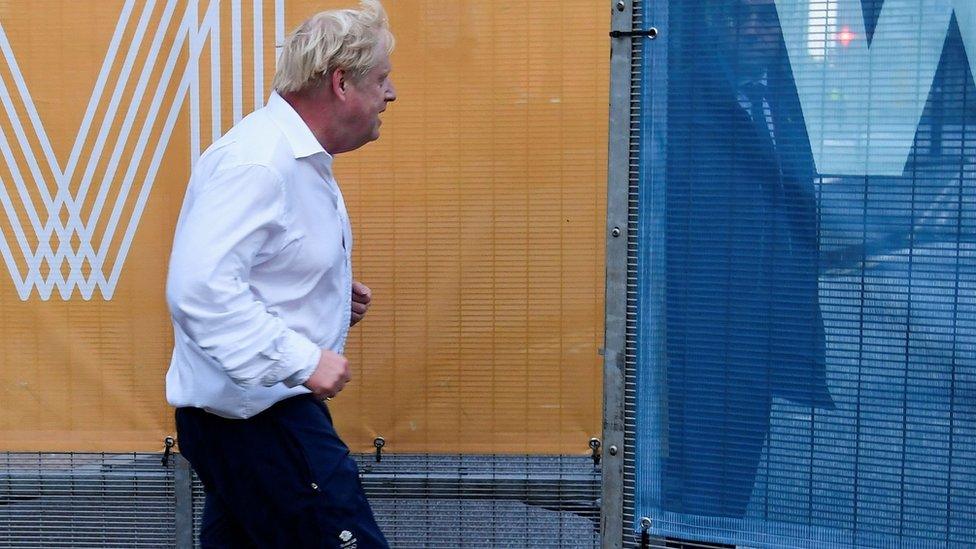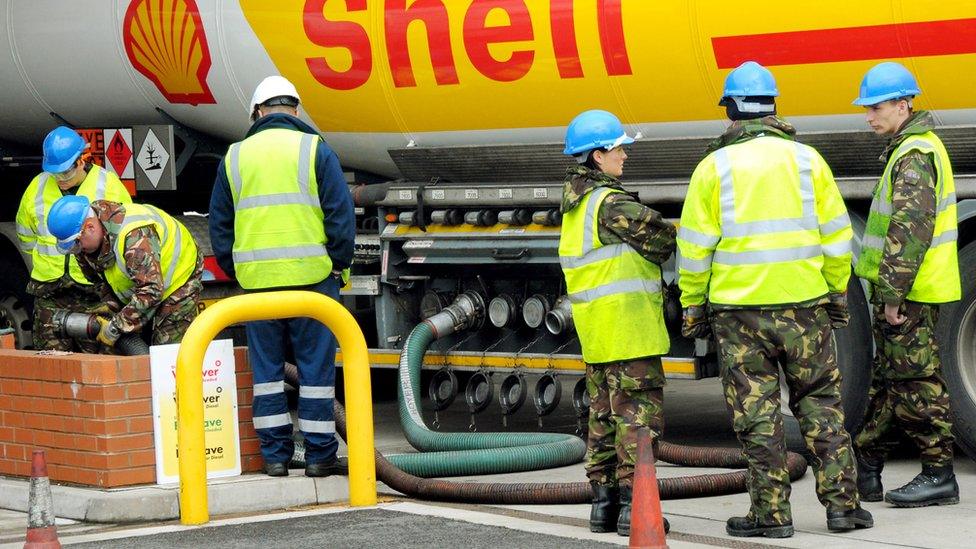Tory conference: PM pledges to improve economy after Covid
- Published

Boris Johnson went for a run in Manchester on Sunday morning
Boris Johnson has pledged the Conservatives will "change and improve" the economy after the pandemic, as the party opens its annual conference in Manchester later.
The PM said the country cannot "go back to how things were" before Covid.
He has accused the haulage industry of being too reliant on low-paid immigration, amid shortages at petrol stations.
The military is due to begin delivering petrol across the UK from Monday.
Two hundred military servicemen and women, 100 of them drivers, will provide "temporary" support to ease pressure on forecourts.
The government has also announced 5,000 temporary visas for foreign lorry drivers to plug a shortage of lorry drivers worsened by Covid, Brexit and other factors.
Although the industry and opposition parties have dismissed these figures as inadequate, Mr Johnson has said importing drivers is not a long-term solution.
Speaking on Saturday, he said: "What we don't want to do is go back to a situation in which we basically allowed the road haulage industry to be sustained with a lot of low-wage immigration."
He added that a "mass immigration approach" had made the sector less attractive by reducing wages and "the quality of the job".
"People don't want that. They want us to be a well-paid, well-skilled, highly productive economy and that's where we're going."
However, he did not rule out issuing more temporary visas, saying the situation would remain "under review".

The conference comes amid a backdrop of the Army preparing to drive petrol tankers
Ahead of the Conservative conference beginning on Sunday, the prime minister vowed to take "big, bold decisions" to rebuild after the pandemic.
"We didn't go through Covid to go back to how things were before - to the status quo ante. Build Back Better means we want things to change and improve as we recover."
The post-pandemic recovery is set to be a key theme of the four-day event in Manchester, along with the government's effort to "level up" regional inequalities.
Around 10,000 delegates are expected in Manchester for the party's first in-person conference since Covid, and the first since its 2019 election victory.
As the conference begins, the party has promised £22m extra funding for councils to renovate tennis courts, and £30m for schools in England to repair sports facilities.
The party argues this will help equalise access to sport in poorer regions, with unplayable courts more likely to be found in deprived areas.


The prime minister has both a substantial Commons majority and leads a party that most recent opinion polls suggest is more popular than Labour.
But as the conference here begins the pressures on the government stack up: queues at some petrol stations, fears of further shortages on shop shelves, even staffing issues in abattoirs.
Prices are rising just as both the furlough scheme and the uplift to universal credit end and an increase to National Insurance looms.
Boris Johnson insists he is taking what he calls the "big, bold decisions" on the priorities people care about, such as social care and supporting jobs.
Expect plenty of talk here in the next few days about the government's desire to "level up", as ministers call it.
It is a promise that collides for many with the reality that it's bills that are going up.

The government has made "levelling up" a priority ahead of the next election but is facing criticism from some of its own MPs that the concept remains vague.
On Sunday, 10 Tory MPs elected in 2019 became the latest set of backbenchers to make demands on the issue, calling for more power, external to be handed to local councils, and for tax breaks for community businesses and social enterprises.
There is also concern in the party over the effect of rising inflation and surging energy costs, combining with the withdrawal of a universal credit top-up of £20 a week, which was introduced during the coronavirus pandemic.
Some of the party's MPs, including former leader Sir Iain Duncan Smith, have joined opposition MPs in warning about a squeeze on living standard for the poorest households.
Labour, which has warned of a "winter of discontent", has urged the PM to recall Parliament to discuss the fuel crisis.
The party's leader Sir Keir Starmer has called on the government to issue "enough visas" to deal with the lorry driver shortage and give "key workers" priority access to fuel.
Related topics
- Published11 October 2021
